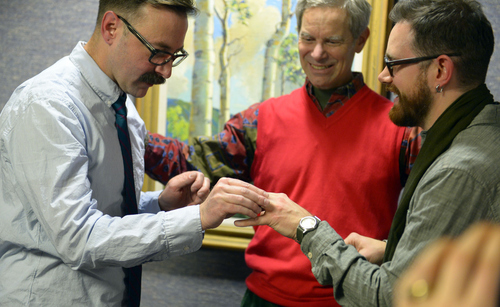This is an archived article that was published on sltrib.com in 2014, and information in the article may be outdated. It is provided only for personal research purposes and may not be reprinted.
It is only getting harder to deny the conclusion of last summer's Windsor decision defining marriage as a due-process right of any couple. In the last two days, federal judges in Oregon and Pennsylvania came to the same inevitable conclusion as Judge Robert Shelby did in Utah last December. In recent months 14 federal judges have ruled against state same-sex marriage bans, and in some cases the states didn't even bother to defend their laws in the wake of Windsor.
And now yet another Utah judge has gotten into the act. U.S. District Court Judge Dale Kimball, a former BYU law professor, ruled Monday that the state cannot deny marital rights to the same-sex couples who married in Utah during that two-week period at the end of 2013. Kimball's decision has no bearing on the Amendment 3 case Judge Shelby decided, but his ruling rests squarely on the precedent of the Windsor case: "As in Windsor, the State's decision to put same-sex marriages on hold 'deprive(s) some couples married under the laws of their State, but not other couples, of both rights and responsibilities'," Kimball wrote.
Attorneys arguing for Utah continue to cling to other language in Windsor that reserves the right of states to define marriage. States still can define marriage, as long as it is applied equally to all people. The state can say marriage requires classes on managing relationships. The state can say no one gets a marriage license on the weekend. But it can't say marriage is for some couples and not for others. This is the reality of Windsor no reasonable federal jurist will deny.
It's worth remembering that this applies only to the legal act of marriage and rights therein. It has nothing to do with how churches define marriage, and there has been enough history inside and outside this country to know that religion and same-sex marriage can co-exist.
It's also worth recalling that this has been an evolution, and it didn't begin last summer. It was more than 40 years ago that psychiatrists stopped considering homosexuality a mental disorder, and it was more than 10 years ago that the U.S. Supreme Court took the police out of the nation's bedrooms by striking down sodomy laws.
Even Utah's reliance on the 2004 vote on Amendment 3 is questionable when polling has shown how people have pivoted. In the meantime, the state is hurting its own citizens by denying their rights to adoption, health insurance and other benefits they deserve.
The coming days will see the 10th Circuit Court of Appeals rule on the Utah's appeal of Judge Shelby's ruling, and it's difficult to see how that court could reconcile the state's position with the Windsor precedent. Then will come the Supreme Court, which would have to twist like a pretzel to resolve its Windsor due-process right with a state's right to deny that right.
No, this is over, and persisting just reinforces the perception that Utah is behind the times and out of sync with the nation.
Come up with a graceful exit, Gov. Herbert and Attorney General Reyes.



